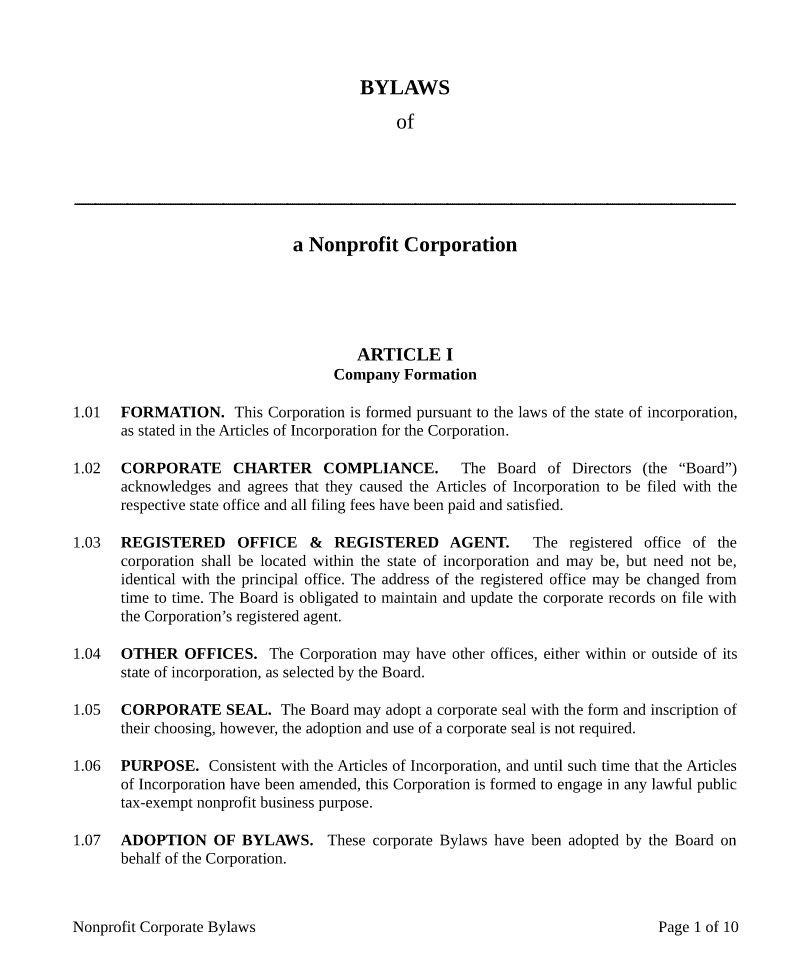
Your bylaws lay the foundation for running your Kansas nonprofit. Bylaws describe the rules and regulations for your nonprofit’s internal operations, such as holding meetings, taking votes, and keeping records. Creating your bylaws is an essential part of your nonprofit’s formation—bylaws help keep your organization running smoothly and prevent disputes between members.
Get started on your Kansas nonprofit bylaws with our free nonprofit bylaws template, drafted by our attorney.

Unlike your Kansas Articles of Incorporation, your bylaws don’t need to be filed with the Kansas Secretary of State. However, having strong bylaws sets your nonprofit up for success in the long run. Why are your bylaws so important?
Kansas state law doesn’t explicitly require bylaws, but KS Stat §17-6008 implies that Kansas corporations should adopt bylaws as a matter of course. KS Stat §17-6008 mandates that all Kansas corporations hold an organizational meeting after submitting their articles of incorporation. At this meeting, either the incorporators or or initial board of directors complete any “acts to perfect the organization of the corporation.” “Adopting bylaws” is listed first among suggested possible organization-perfecting activities.
The IRS, government agencies, financial institutions, investors, landlords, and partnering companies are all third parties that will commonly ask to see your bylaws. Examining your bylaws allows these third parties to assess the legitimacy of your organization before doing business with your nonprofit or granting your nonprofit benefits. For example, a landlord might request a copy of your bylaws before renting offices to you, or you may need to include a copy of your bylaws on a grant application.
If you don’t have strong bylaws, you may be putting your nonprofit at risk. How? Bylaws are designed to guide your board of directors through the actions of governing your nonprofit. This guidance should include rules for situations where disagreements may occur, such as removing a board member or handling conflicts of interest. Without such rules, members of your nonprofit may argue over the best course of action, leading to a dispute. Disputes hurt your nonprofit’s finances and reputation, especially if you face a state investigation or are taken to court. Protect your nonprofit from negative legal consequences with comprehensive bylaws.
Want to learn more? Check out our Guide to Nonprofits.
Your Kansas nonprofit bylaws should begin with basic details about your nonprofit, such as its name, address, and purpose. However, most of your bylaws will be devoted to defining the specific rules for running your business, including:
You are permitted to add any provisions you wish as long as those provisions don’t contradict your articles of incorporation or the law.
Yes. Your bylaws are a legally binding agreement on how to manage your nonprofit, and everyone in your organization must follow the regulations laid out in your bylaws. If your bylaws are violated, there could be serious legal repercussions for the individuals involved and your nonprofit overall.
Whether your bylaws become public record or not depends on your nonprofit. Because you don’t need to file your bylaws with the Kansas Secretary of State, you could keep your bylaws private. However, if you seek 501(c)(3) tax-exempt status with the IRS, you must attach your bylaws to your application, and the IRS makes all applications public. Many nonprofits also choose to publish their bylaws to strengthen trust among supporters and donors.
We get it—creating your bylaws can be an intimidating process. That’s why we’ve given you a head start with our free, attorney-drafted nonprofit bylaws template.